小升初英语情态动词will
will作动词的四种形式

will作动词的四种形式Will作为动词有四种形式:will, will have, will be, will be having。
下面将分别对这四种形式进行解释和举例说明。
1. willwill作为一般将来时的情态动词,表示将要发生的动作或存在的状态。
它用于表示主观的意愿、决心、承诺、预测、推测等。
例如:- I will go to the concert tomorrow.(我明天会去听音乐会。
)- She will help you with your homework.(她会帮你做作业。
)- They will arrive at the airport at 6 PM.(他们会在下午6点到达机场。
)2. will havewill have用于表示将来某一时间点之前已经完成的动作。
它表示对将来某一时刻或某一动作的预测或推测。
例如:- By the time you arrive, I will have finished cooking dinner.(等你到达的时候,我会已经做好晚饭了。
)- She will have graduated from university by next year.(她到明年会已经大学毕业了。
)- They will have arrived at the hotel before noon.(他们到中午之前会已经到达酒店。
)3. will bewill be用于表示将来某一时刻正在进行的动作或存在的状态。
它表示对将来某一时刻的预测或推测。
例如:- I will be studying for the exam this time tomorrow.(明天这个时候我会正在备考。
)- She will be working at the office all day tomorrow.(明天一整天她会在办公室工作。
)- They will be traveling around Europe next month.(下个月他们会在欧洲旅行。
冀教版小升初英语语法总复习
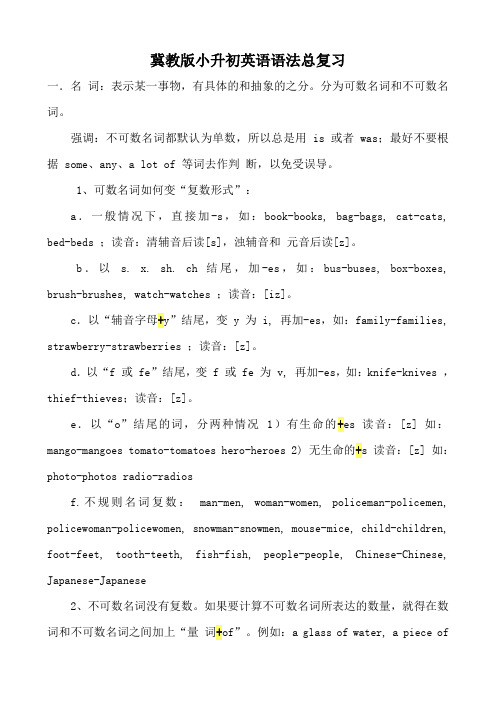
冀教版小升初英语语法总复习一.名词:表示某一事物,有具体的和抽象的之分。
分为可数名词和不可数名词。
强调:不可数名词都默认为单数,所以总是用 is 或者 was;最好不要根据 some、any、a lot of 等词去作判断,以免受误导。
1、可数名词如何变“复数形式”:a.一般情况下,直接加-s,如:book-books, bag-bags, cat-cats, bed-beds ;读音:清辅音后读[s],浊辅音和元音后读[z]。
b.以s. x. sh. ch 结尾,加-es,如:bus-buses, box-boxes, brush-brushes, watch-watches ;读音:[iz]。
c.以“辅音字母+y”结尾,变 y 为 i, 再加-es,如:family-families, strawberry-strawberries ;读音:[z]。
d.以“f 或fe”结尾,变 f 或 fe 为 v, 再加-es,如:knife-knives ,thief-thieves;读音:[z]。
e.以“o”结尾的词,分两种情况 1)有生命的+es 读音:[z] 如:mango-mangoes tomato-tomatoes hero-heroes 2) 无生命的+s 读音:[z] 如:photo-photos radio-radiosf.不规则名词复数:man-men, woman-women, policeman-policemen, policewoman-policewomen, snowman-snowmen, mouse-mice, child-children, foot-feet, tooth-teeth, fish-fish, people-people, Chinese-Chinese, Japanese-Japanese2、不可数名词没有复数。
如果要计算不可数名词所表达的数量,就得在数词和不可数名词之间加上“量词+of”。
情态动词will的用法总结归纳

情态动词will的用法总结归纳好嘞,今天咱们聊聊情态动词“will”。
听起来有点学术,但其实说白了就是“将来”的意思,挺简单的嘛。
想象一下,你在跟朋友聊天,突然想到明天的计划。
“我明天会去跑步”,这时候你就可以用“will”来表达了,超自然的。
生活中啊,使用“will”简直是如鱼得水。
要是你想给人留个好印象,记得把它多放在嘴边哦。
先说说“will”怎么用。
你可能已经发现,它经常出现在承诺、决定、预测这些场合。
比如说,你对你的朋友说:“我会帮你搬家。
”听上去很靠谱吧?这可是表明你愿意帮忙的信号。
这种时候,使用“will”就是在发出一个未来的承诺,给对方一种踏实感。
再比如,有时候天气预报一说:“明天会下雨”,这就是在预测未来的事情。
有点像魔法,不是吗?再看看“will”的另一面。
它不仅可以用在积极的句子中,有时候我们也会用它来表达拒绝或者否定。
比如,想象一下,你在朋友的聚会上,一直有人给你夹菜,你不想吃,于是你说:“我不会吃这个。
”咱们这时候用“will”就是在坚决表明自己的态度,不给别人留机会。
直接了当,轻松搞定!生活中,能够清晰地表达自己的意愿可是非常重要的哦。
说到这里,有些小伙伴可能会问:“那‘will’和‘be going to’有什么区别呢?”哈哈,这真是个好问题!简单来说,“will”更像是临时的决定,随时随地都能用。
而“be going to”则更有计划性,就像你已经在心里掂量过要做的事情了。
比如,如果你在路上突然决定去看电影,你就会说:“我会去看电影。
”但如果你早就安排好这个计划,心里有谱了,就可以说:“我打算去看电影。
”这两者之间的区别就像临时起意和早有预谋,绝对不能搞混了哦!生活中,咱们也经常用“will”来表达意愿。
比如,你想请朋友吃饭,你可以说:“我会请你吃饭!”这不仅是一个承诺,更像是向对方传递一份温暖。
想想,能为朋友做点事情,心里就特别美。
再比如,有时候我们会对未来充满希望:“我相信一切都会好的。
2021小升初英语总复习 第四部分 时态精析 第一节动词
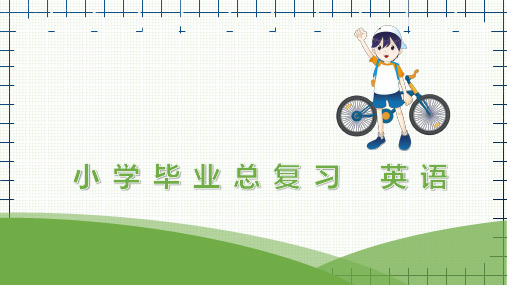
返回目录
6. What ___d_i_d_____ (do) she do last night? 7. My aunt often ___g_o_es_____ (go) shopping on Sundays. 8. Sarah __b_o_u_g_h_t___ (buy) a red bag yesterday.
第四部分
时态精析
第一节 动 词ຫໍສະໝຸດ 知识梳理一、动词的概念与分类 动词是句子中表示动作或者状态的词。根据动词的词义和在句 中的作用,可以将动词划分为如下几类:
分类
例词
情态动词 can, may, must, need, should, would 系动词(be动词) am, is, are, was, were
将来时:There will be a match between Class 1 and Class 2 tomorrow.
明天一班和二班之间会有一场比赛。 I am going to Hainan next week. 下周我将去海南。
3. 助动词:不能单独在句中使用,在句中的作用是协助主要 动词构成时态或语态,也可构成疑问句或否定句。小学阶段未 涉及语态的知识,故本书不作详细讲解。如:
2. be动词:根据人称、数和时态的不同,呈现不同形式。如: 现在时:I am very happy today. 今天我非常开心。
Mike is an American boy. 迈克是一个美国男孩。 They are playing in the snow. 他们正在雪里玩。
过去时: He was in Grade 3 last year. 去年他上三年级。 We were at home yesterday. 昨天我们在家。
英语中动词的讲解
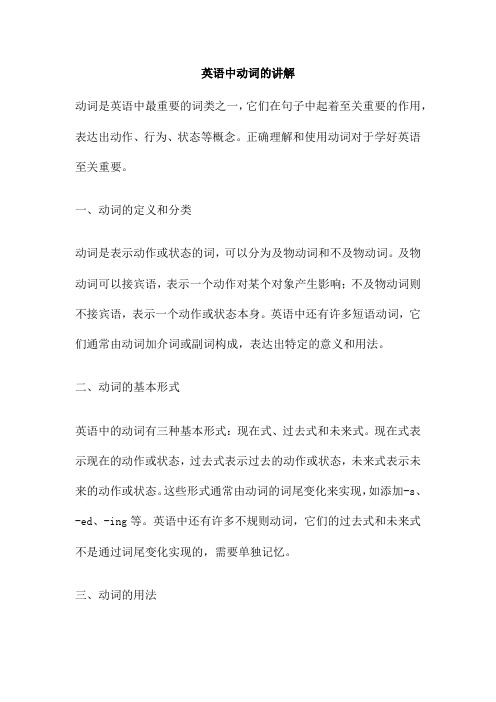
英语中动词的讲解动词是英语中最重要的词类之一,它们在句子中起着至关重要的作用,表达出动作、行为、状态等概念。
正确理解和使用动词对于学好英语至关重要。
一、动词的定义和分类动词是表示动作或状态的词,可以分为及物动词和不及物动词。
及物动词可以接宾语,表示一个动作对某个对象产生影响;不及物动词则不接宾语,表示一个动作或状态本身。
英语中还有许多短语动词,它们通常由动词加介词或副词构成,表达出特定的意义和用法。
二、动词的基本形式英语中的动词有三种基本形式:现在式、过去式和未来式。
现在式表示现在的动作或状态,过去式表示过去的动作或状态,未来式表示未来的动作或状态。
这些形式通常由动词的词尾变化来实现,如添加-s、-ed、-ing等。
英语中还有许多不规则动词,它们的过去式和未来式不是通过词尾变化实现的,需要单独记忆。
三、动词的用法动词在不同的语境中有不同的用法。
在陈述句中,动词通常出现在主语之后,表示主语进行的动作或状态。
在疑问句中,动词通常出现在主语之前,表示询问主语进行的动作或状态。
在否定句中,动词之前加上not或never等否定词,表示否定或拒绝的动作或状态。
动词还可以用于祈使句中,表示请求或命令的动作或状态。
四、动词的搭配英语中的动词有许多固定的搭配,这些搭配通常由动词和介词、副词等组成。
例如,look at表示看某物,go to表示去某个地方,listen to表示听某个声音。
这些搭配不仅表达出特定的意义和用法,也体现了英语的习惯用法和语言文化。
英语中的动词是理解和使用英语的关键之一。
通过掌握动词的分类、基本形式、用法和搭配等方面,可以更好地理解和运用英语语言。
情态动词是英语语法中的重要部分,它们表达了说话者的意愿、可能性和判断。
掌握好情态动词的使用对于理解和使用英语至关重要。
在这篇文章中,我们将详细讲解高中英语中的情态动词。
情态动词是用来表达情态的动词,它们描绘了说话者的感情、态度或观点。
情态动词可以分为三类:可能性情态动词、义务情态动词和愿望情态动词。
2020年小升初英语热点题型一03词法(动词、介词、连词)

2020年小升初英语热点题型一词法(3)动词、介词、连词【要点归纳】一、动词【重点】(一)动词这里所说的动词是指各种动词总称,其中包括be 动词、情态动词、助动词、行为动词。
1.be 动词(am, is , are, was, were)1).am-was, is-was, are-were. 口诀:我用am, 你用are, is 用在他她它,所有复数全用are.2).肯定和否定句I am (not) from London. He is (not) a teacher.She is (not) in the dinning room.My hair is (not) long. Her eyes are (not) small.3).一般疑问句Am I a Chinese? –Yes, you are./ No, you aren’t.Are they American? --Yes, they are. / No, they aren’t.Is the cat fat? --Yes, it is./ No, it isn’t.4).be 动词的否定形式:am not(没有缩写形式), are not= aren’t.is not= isn’t.2.助动词(do, does, did)do, does 用于一般现在时态,其过去式did 用于一般过去时,它们通常用在疑问句和否定句中,它们的否定形式是:do not= don’t.does not= doesn’t. did not=didn’t.注意:在一般现在时中,does 用于第三人称单数,其余一律用助动词do; 助动词do, does, did 后面一定要用动词原形。
3.情态动词情态动词也是一类特殊的动词,平时我们不把它说成是动词。
情态动词可以和行为动词同时出现在同一个句子中。
我们现在学过的情态动词有: can, could, shall, should, will, would, may, might, must.注意:情态动词后动词总是用原形。
初二下情态动词用法
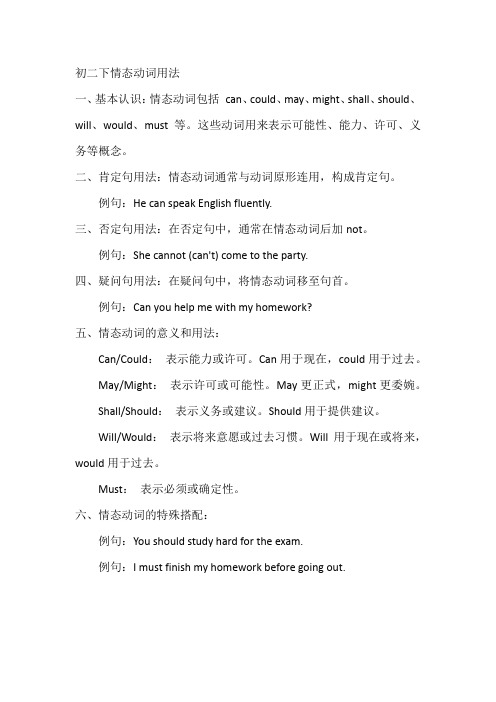
初二下情态动词用法
一、基本认识:情态动词包括can、could、may、might、shall、should、will、would、must等。
这些动词用来表示可能性、能力、许可、义务等概念。
二、肯定句用法:情态动词通常与动词原形连用,构成肯定句。
例句:He can speak English fluently.
三、否定句用法:在否定句中,通常在情态动词后加not。
例句:She cannot (can't) come to the party.
四、疑问句用法:在疑问句中,将情态动词移至句首。
例句:Can you help me with my homework?
五、情态动词的意义和用法:
Can/Could:表示能力或许可。
Can用于现在,could用于过去。
May/Might:表示许可或可能性。
May更正式,might更委婉。
Shall/Should:表示义务或建议。
Should用于提供建议。
Will/Would:表示将来意愿或过去习惯。
Will用于现在或将来,would用于过去。
Must:表示必须或确定性。
六、情态动词的特殊搭配:
例句:You should study hard for the exam.
例句:I must finish my homework before going out.。
小学-英语-小升初-小升初英语名校招生预测卷(8)
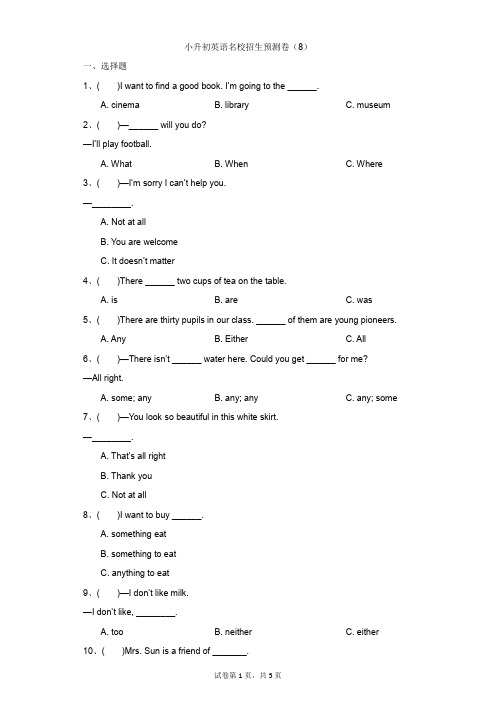
小升初英语名校招生预测卷(8)一、选择题1、( )I want to find a good book. I’m going to the ______.A. cinemaB. libraryC. museum2、( )—______ will you do?—I’ll play football.A. WhatB. WhenC. Where3、( )—I’m sorry I can’t help you.—________.A. Not at allB. You are welcomeC. It doesn’t matter4、( )There ______ two cups of tea on the table.A. isB. areC. was5、( )There are thirty pupils in our class. ______ of them are young pioneers.A. AnyB. EitherC. All6、( )—There isn’t ______ water here. Could you get ______ for me?—All right.A. some; anyB. any; anyC. any; some7、( )—You look so beautiful in this white skirt.—________.A. That’s all rightB. Thank youC. Not at all8、( )I want to buy ______.A. something eatB. something to eatC. anything to eat9、( )—I don’t like milk.—I don’t like, ________.A. tooB. neitherC. either10、( )Mrs. Sun is a friend of _______.A. Mary's motherB. mother of MaryC. Mary's mother's二、语音知识。
六年级下册英语讲义-小升初语法复习: 情态动词 6(含答案)全国通用
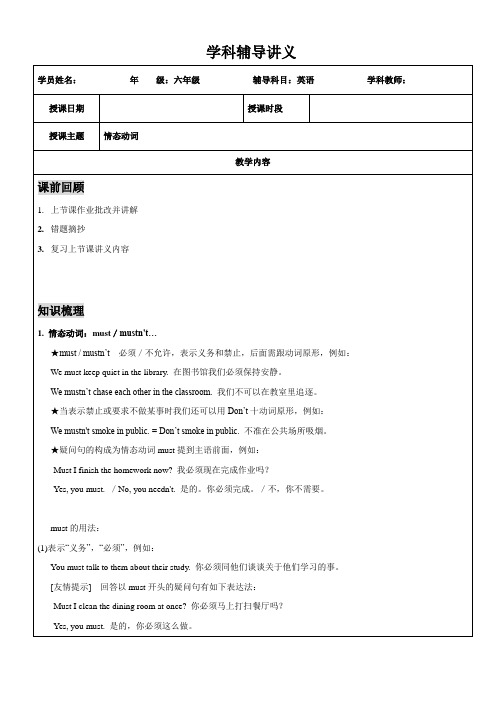
学科辅导讲义I will have to finish the work tomorrow.我明天必须完成这项工作。
(3)否定形式don't/doesn't have to表示“不必”,而mustn't则表示“不应该;禁止”。
e. g. You don't have to wait for me.你不必等我。
We mustn't cut in line.我们不应该插队。
7.情态动词should①表示义务,意为“应该;应当;最好”,比must委婉e. g. You should apologize to him.你应该向他道歉。
You should not eat so greedily.你不应该如此贪吃。
My teacher said (that)I should study harder.老师说我应该更加用功地读书。
②与疑问词连用,表示意外、纳闷、惊讶等,意为“究竟是……;到底是……”e. g. Why should you think that way? 你到底为什么会那么想呢?How should I know? 我怎么会知道?8.情态动词:need1. need是一个特殊的情态动词,意为“需要”。
它不仅能作为情态动词使用,还能充当一个实义动词。
如:Need I do my homework now?我必须现在做家庭作业吗?What do you need?你需要什么?2. need用作行为动词时,用法与其它行为动词相同。
如:You don't need to finish it right now.你不用现在就完成它。
We need to have a break.我们需要休息。
Do they need to know this?他们需要知道吗?3. need作为情态动词时,其过去式为need。
但need作为实义动词时,其过去式为needed.如:I'm sorry I need answer a phone call.So I couldn't talk with you yesterday.抱歉我昨天要听电话,没能跟你好好谈谈。
小升初英语复习指南--英语词汇
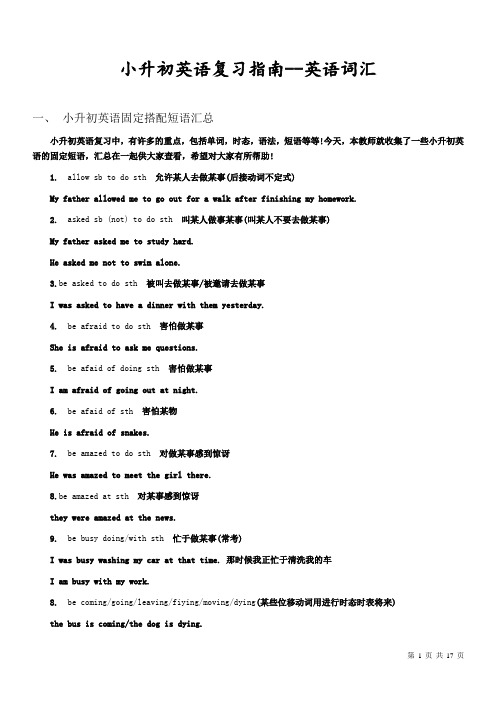
小升初英语复习指南--英语词汇一、小升初英语固定搭配短语汇总小升初英语复习中,有许多的重点,包括单词,时态,语法,短语等等!今天,本教师就收集了一些小升初英语的固定短语,汇总在一起供大家查看,希望对大家有所帮助!1.allow sb to do sth允许某人去做某事(后接动词不定式)My father allowed me to go out for a walk after finishing my homework.2. asked sb (not) to do sth叫某人做事某事(叫某人不要去做某事)My father asked me to study hard.He asked me not to swim alone.3.be asked to do sth被叫去做某事/被邀请去做某事I was asked to have a dinner with them yesterday.4. be afraid to do sth害怕做某事She is afraid to ask me questions.5. be afaid of doing sth害怕做某事I am afraid of going out at night.6. be afaid of sth害怕某物He is afraid of snakes.7. be amazed to do sth对做某事感到惊讶He was amazed to meet the girl there.8.be amazed at sth对某事感到惊讶they were amazed at the news.9. be busy doing/with sth忙于做某事(常考)I was busy washing my car at that time. 那时候我正忙于清洗我的车I am busy with my work.8. be coming/going/leaving/fiying/moving/dying(某些位移动词用进行时态时表将来)the bus is coming/the dog is dying.9. be excited to do sth对做……感到兴奋Jacky was excited to travel there by plane.be excited at sthLily was excited at his words.be excited about doing sthhe was excited about passing the exam without going overing books.10. be frightened to do sth害怕去做某事Sam is frightened to ride a horse.11. be glad/happy to do sth高兴去做某事she is happy to clean the blackboard with me.be pleased to do sth高兴做某事she was pleased to help the old man yesterday.be pleased with sth对某事感到高兴/满意the teacher was pleased with my answer.12.be interested in sth/doing sth对某事感兴趣/对做某事感兴趣she is interested in swimming in the river.My btother is interested in Chinese.13.be/get ready for/to do sthBe ready for sth为某事做好了准备We are ready for the exam.Be ready to do sth为做某事做好了准备We are ready to have a birthday party for her.get ready for sth为某事在做准备We are getting ready for the exam.get ready for sth为做某事而做准备13. be sorry to do sth对做某事感到抱歉14.be surprised to do sth对做某事感到惊奇be surprised at sth 对某事感到惊奇15. be worth doing sth值得做某事(worth 后接动词-ing形式,常考)16. 开始去做某事begin to do sthbegin/start to do/doing sth17. can/be able to afford (to buy) sth 有能力购买(供)……18. can/may/must do sth could/would/should/might do sth19. can’t wait to do sth 迫不急待地去做某事20. decide to do sth 决定去做某事make up one’s mind to do sth 下决心去做某事(常考)make a decision to do sth 对做某事作出决定21. deserve to do sth 值得/应该做……22. encourage sb to do sth 鼓励某人去做某事23. enjoy doing sth 乐意去做某事24. expect (sb) to do sth 期望去做某事25. fail to do sth 做某事失败succeed doing sth 成功做了某事26. finish doing sth 做完某事(后接动词-ing形式)(常考)27. follow sb to do sth 跟随某人去做某事28. 让某人做某事(后接动词原形)get sb to do sthmake sb do sthlet sb do sth29. get/have a chance to do sth 得到一个做某事的机会30. give/pass/show/lend/sell sb sth/sth to sbbuy/get/bring sb sth/sth for sb31. go on to do sth 继续做事(常考)go on doing sth 继续做事(常考)32. hate to do/doing sth 讨厌/不喜欢做某事33. have fun doing sth34. have problems doing sth 做某事遇到困难35. 让某人做某事(后接动词原形)have sb do sthhave sth donehave sth to do 工有事要做36. hear sb do sth 听到某人做某事(后接动词原形,常考)hear sb doing sth 听到某人正在做某事(常见)37. help to do sth 帮忙做某事help sb (to) do sth 帮助某人做某事38. hope/wish to do sth 希望做某事wish sb to do sth 希望某人做某事39. I t seems that 这像是……(后接从句)seem to do sthseem +adj40. It’s + adj+(for sb) to do sth .It’s+adj +(of sb) to do sthIt’s glad for him to hear the news.41. It takes sb some time/money to do sth . 花费某人多长时间做某事42. pay …for… cost spend…on….. it take …to do sth43. It’s best for sb to do sth. 对某人来说做某事是最好的had better do sth 最好做某事(注意had没有时态和人称的变化,better后接动词原形)44. It’s time for sb to do sth 是某人做某事的时候了45. keep (on)doing sth 坚持做某事(常考)keep sb doing sth 让某人做某事(常考)keep sb from doing sth 阻止某人做某事(常考)keep sb/sth +adjkeep the book for 2 days 借这本书两天(不要用borrow或lend)46. learn to do sth 学做某事learn sth from sb 向某人学习47. like to do/doing sth 喜欢做某事like sb to do sth 喜欢某人做某事48. need to do sth 需要做某事need doing sth/to be doneneed sth needn’t do sth49. prefer to do sth rather than do sth 宁愿……而不愿……(常考)prefer doing sth to doing sth 喜欢做……胜过做……I prefer reading books to going shopping. 比起购物来,我更爱读书。
2020年河南省三门峡市小升初英语试卷和答案

2020年河南省三门峡市小升初英语试卷一、听音选词。
选出你所听到句子中包含的单词或短语,将其标号填入题前括号内。
(10分)1.(10分)听音,画圈.(1)A . young B . younger C . longer(2)A . have B . hasC . had (3)A . drank B . drinkC . think (4)A . to B . two C . too(5)A . happen B . happens C . happened二、听选答语。
选出合适的应答语,使其标号填入题前括号内。
(10分)2.(10分)听选答语。
选出合适的应答语,使其标号填入题前括号内。
(1)A. I'm 40 kg.B I'm 154 cm. C.I'm 12. (2)A. It's fine. B. It's good. C. It was good.(3)A.I cleaned the room. B. I clean the room. C. I am cleaningthe room.(4)A. I went to Hong Kong. B. I went there by plane. C. I'm going tobuy a book.(5)A. I went to Hainan. B. I will go to Hainan.C. I want to go toHainan.三、听音判断。
根据录音内容,判断正(T)误(F)。
(10分)3.(10分)听音判断。
根据录音内容,判断正(T)误(F)。
(1)Anna usually goes to work on foot.(2)Anna likes winter best because of the winter holiday.(3)Anna likes singing and dancing.(4)Beef is Anna's favourite food.(5)They ate fresh food in Shanghai.四、选出不同类的单词。
小学英语小升初专题训练-词法专项练习:情态动词 50题(含答案)

小学英语小升初专题训练-词法专项练习:情态动词一、单选题(共34题;共68分)1."You ________ kill Snow White," said the queen.A. mustB. couldC. can2.We should ________ too many trees.A. stop cutting downB. stop cut downC. stopping cut down3.You shouldn't the trash in the woods after the picnic.A. leaveB. leftC. want4._________ you please give me a glass of juice?A. CanB. CouldC. May5.Shanghai is _________ a big city in China.A. mustB. reallyC. can6._________ I have some juice?A. WouldB. CanC. May7.Hello, _________ I speak to my mother?A. mayB. whyC. how8.We be quiet in the classroom.A. shouldB. shouldn'tC. can't9.When you feel angry, you should __________________ a deep breath and count to ten.A. doB. takesC. take10.What can you ______?A. doB. doesC. doing11.Hurry up! I can't _________ the balloons.A. holdB. heldC. holding12.The kite can ________ high in the sky.A. flyB. flyingC. flies13.Mike couldn't swimming before.A. goB. goesC. went14.Could you _______ stars at night?A. seeB. sawC. sea15.Can you _______ the dog's barking?A. listenB. listeningC. hear16.We should _______________ hard and _______________ healthy.A. studies; staysB. studying; stayingC. study; stay17.__________wood, we _________cut down too many trees.A. Save; shouldn'tB. To save; shouldn'tC. To save; should18._________ you please give me a pencil?A. CanB. CouldC. May19.Can you my pen friend?A. beB. to beC. being20.We should not on the grass.A. walkingB. to walkC. walk21.—_________ you like some juice?—No, thanks.A. CanB. WouldC. Could22.Trees are good for us. We _________ take good care of them.A. couldB. mayC. should23.— _________ I hand in my homework this afternoon?—No, you _________. You can hand it in tomorrow,A. Must, mustn'tB. May, can'tC. Must, needn't24.Louis ________ run, but he ________ swim in the river. He is only 5.A. can; can'tB. can't; can'tC. can; can25.He was three then. He______________ talk. He______________ swim.A. can; canB. can't; couldn'tC. could; couldn't26.You______________ be late. You______________ work hard.A. should: shouldB. should; shouldn'tC. shouldn't; should27.You______________ take the books down.A. shouldB. shouldn'tC. could angry now!28.The girl______________ walk then.A. canB. couldn'tC. can t29.Can you see the red man? You ______ cross the road now.A. mustn'tB. mustC. can30.—Who will be responsible for classroom cleaning, Jim or Nancy?—It be Jim because he is on holiday.A. needn'tB. shouldn'tC. mustn'tD. can't31.There was nothing he________ do.A. canB. couldC. coulds32.Suddenly Mocky couldn't________.A. breatheB. breathedC. breathes33.— What can she _____?— She can play ping-pong.A. doesB. doC. doesn'tD. don't34.— Can I wear my new skirt today?— Yes, you _______.A. canB. can'tC. doD. don't二、选词填空(词汇运用)(共2题;共2分)35.________ (Can/Could) I help you?36.You ________(should /shouldn't) clean your room.三、语法填空(共14题;共24分)37.Helen Keller ________ (could) hear.38.We should ________ (keep) ________ (we) city clean.39.We ________ (should) stop ________ (use) plastic bags.40.You can ________ (see) a lot of tall ________ (building).41.Please stop ________ (make) noise. I can't ________ (hear) the teacher.42.All of us should ________ (do) something ________ (save) wild animals.43.You should ________ (be) quiet in the library.44.The driver must ________ (look) at the traffic lights.45.We must ________ (listen) to our teachers in class.46.We ________ (must) play near fires.47.We ________ (must) keep our classroom clean.48.I couldn't speak English then. But I ________ (can) speak English now.49.We should ________ (take) exercise every day.50.用情态动词can,must,should,shall填空(1)At Halloween you________ give candy to the children if they come to knock at your door. (2)What________Danny do if he wants to become thin and healthy?(3)When________we go to see the film "Rabbit Run"?(4)In the Science Museum you________see robots playing the piano well.(5)We________know a lot of English words if we want learn English well.(6)________ we go to the park and fly our kites there?答案解析部分一、单选题1.【答案】A【考点】动词辨析,情态动词【解析】【分析】句意:“你……杀死白雪公主。
小升初语法易错动词四大时态(专项训练)人教PEP版英语六年级下册

六年级英语小升初语法易错动词四大时态综合训练卷班级: 姓名: 得分:一、基础训练1.[基础]按要求写出下列单词的正确形式。
(1) is(过去式) (9) do(三单)(2) like(三单) (10) swim(现在分词)(3) study(过去式) (11) play(过去式)(4) see(现在分词) (12) can(过去式)(5) think(过去式) (13) go(过去式)(6) buy(过去式) (14) dish(三单)(7) wash(三单) (15) have(现在分词)(8) run(三单)2.[be动词]用be动词的正确形式填空。
(1)I from China, But my friends, Lily and Lucy, from America.(2) It sunny today, but it was rainy yesterday. Tomorrow, it will snowy(3) My parents young twenty years ago. Now, they old. But I love them.(4)I active now. But three years ago, I very shy.(5)I want to a teacher, because my parents both teachers.(6)—— Jack from Beijing? ——No, he3.[助动词、情态动词]用do或will 的正确形式填空。
(1) What your brother do at weekends?——He plays basketball with his friends.(2) What you do last Sunday? ——I visited the Great Wall(3) When you go to London? ——Tomorrow morning.(4) you your homework yesterday? ——Yes, I(5) you go to the cinema with me next Sunday?——No, I4.[应用]用所给词的适当形式填空。
2020年河南省平顶山市湛河区小升初英语试卷和答案
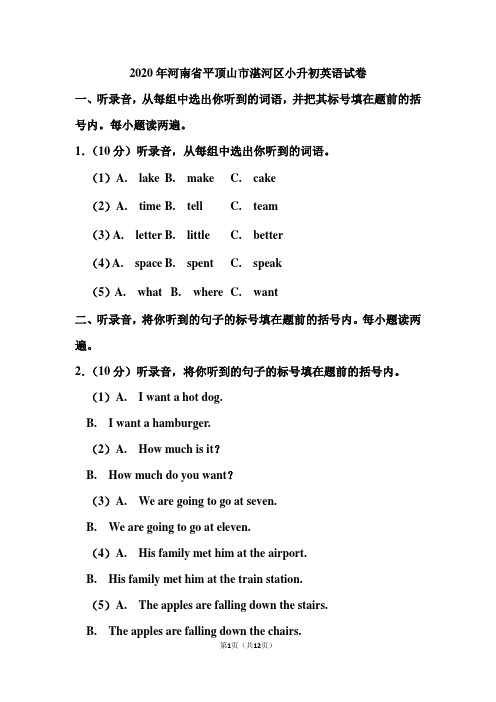
2020年河南省平顶山市湛河区小升初英语试卷一、听录音,从每组中选出你听到的词语,并把其标号填在题前的括号内。
每小题读两遍。
1.(10分)听录音,从每组中选出你听到的词语。
(1)A. lake B. make C. cake(2)A. time B. tell C. team(3)A. letter B. little C. better(4)A. space B. spent C. speak(5)A. what B. where C. want二、听录音,将你听到的句子的标号填在题前的括号内。
每小题读两遍。
2.(10分)听录音,将你听到的句子的标号填在题前的括号内。
(1)A. I want a hot dog.B. I want a hamburger.(2)A. How much is it?B. How much do you want?(3)A. We are going to go at seven.B. We are going to go at eleven.(4)A. His family met him at the airport.B. His family met him at the train station.(5)A. The apples are falling down the stairs.B. The apples are falling down the chairs.三、听录音,选出正确的图片,将其标号填在相应的题号后。
每句读两遍。
3.(10分)听录音,选出正确的图片,将其标号填在相应的题号后。
每句读两遍。
四、找出不同类的单词,把其标号填在括号里。
(10分)4.(2分)找出不同类的单词()A.duck B.dog C.park5.(2分)找出不同类的单词()A.snow B.cloud C.sunny6.(2分)找出不同类的单词()A.basket B.football C.baseball7.(2分)找出不同类的单词()A.get B.look C.bought8.(2分)找出不同类的单词()A.good B.love C.happy五、找出下列句子的答语,并把正确答案的标号填在题前的括号内(10分)9.(10分)找出下列句子的答语。
小升初英语专项-情态动词

小升初专项提优精品试题情态动词一,选择方框内的情态动词并用其适当形式填空1.-I have an apple pie, please? -OK. Here you are.2. Look at the sign. It says the museum closes at 5: 00. We leave now.3. -Must I arrive here at 7:00 tomorrow?-No, you It's too early.4. Look at the sign. We start campfires here.5. Time is up. You stop writing now, children.6.- we go to see a film this Friday?-That sounds great.7. -Does your friend walk there?-I'm not sure. He drive there.8. -Have you decided where to spend your summer holiday?-Not yet. We go to Hong Kong.9. You have already tried your best, so you don't to worry too much about the exams.10. Which club you like to join, football club or chess club?二、选择填空。
( )1.- I take a look at the menu?-Sure. Here you are.A. MayB. ShouldC. Shall( )2. You always finish your work on time, Jason.A. CanB. ShouldC. need( )3. This book _____Tom's. I can see Anna's name on it.A. might beB. may beC. can't be( )4.- I borrow your crayons?-OK. Here you are.A. MustB. MayC. Need( )5. - Bob, shall we go to see a film today?-Sorry, I'm afraid I can't. You ask Peter.A. NeedB. mayC. must( )6. -Have you decided what to do tomorrow?-Not yet. We go fishing tomorrow.A. MayB. shouldC. must( )7. -What birds do? -They can't swim.A. CanB. can'tC. must( )8. Boys and girls, you not play with fire. It is dangerous.A. MustB. mayC. can( )9. You brush your teeth twice every day.A. NeedB. shouldC. may( )10. - Dad, can I go to the party tonight?-Sure, but you come back home before 9 o'clock.A. CanB. mustC. may三、按要求改写句子,每格限一词。
小升初英语情态动词——will
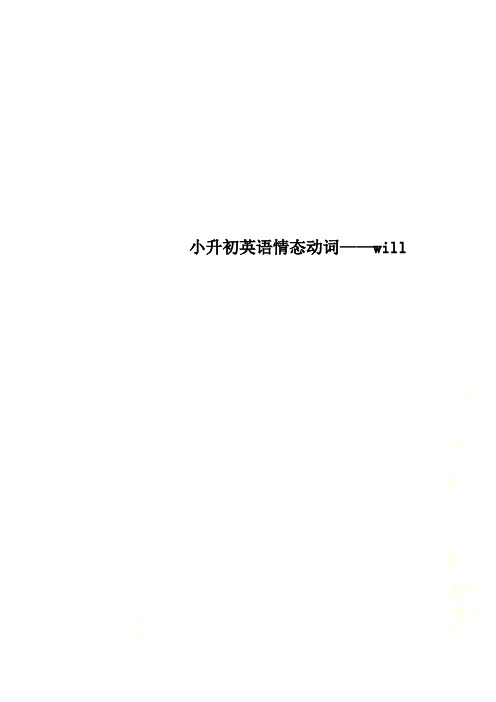
小升初英语情态动词——will
小升初英语情态动词——will
可用于各人称,表示 "意志"、"意愿"、"决心"、"允诺"等。
如:
I will try. 我愿一试。
I will do my best. 我一定尽力而为。
We will never do it again. 我们永远不会再做此事了。
Which will you fake?你要哪一个?
Who will go with me? 谁愿和我一同去?
will在疑问句中用子第二人称时
这时句子表示说话人向对方提出请求或询问。
如:
Will you please explain the sentence once more?请你再把这个句子解释一遍好吗?
Will you have western food or Chinese food,Mr. Smith? 史密斯先生,你吃西餐还是中餐?
Will you pass me the butter? 请你把黄油递给我好吗?
注意下面句中的won't亦表请求:
Won't you come in ?请进来好吗?。
will知识点梳理六年级

will知识点梳理六年级一、意义和重要性中学入学考试是每个六年级学生必须面对的重要考试之一,对于他们的学业发展起到了至关重要的作用。
在准备这一考试时,理解和掌握六年级的Will知识点是必不可少的。
下面将对六年级Will知识点进行梳理和总结。
二、结构和用法1. 肯定句结构:主语 + will + 动词原形 + 其他成分例如:- I will go to school tomorrow.- She will help her mother clean the house.2. 否定句结构:主语 + will not / won't + 动词原形 + 其他成分例如:- They won't come to the party.- He won't watch TV tonight.3. 一般疑问句结构:Will + 主语 + 动词原形 + 其他成分?例如:- Will you bring your book tomorrow?- Will he join the club?4. 特殊疑问句结构:疑问词 + will + 主语 + 动词原形 + 其他成分?例如:- When will you go to the zoo?- What will she buy for her birthday?三、用法详解1. 表示未来计划和打算Will可用于表达对未来的计划和打算。
例如,我们可以说: - I will study hard for the exam.- She will visit her grandmother on the weekend.2. 表示意愿和请求Will还可以用于表达意愿和请求。
例如:- Will you help me carry these books?- I won't borrow your pen, I will use my own.3. 表示预测和推测Will有时用于表示对未来情况的预测和推测。
广州市小升初英语语法要点
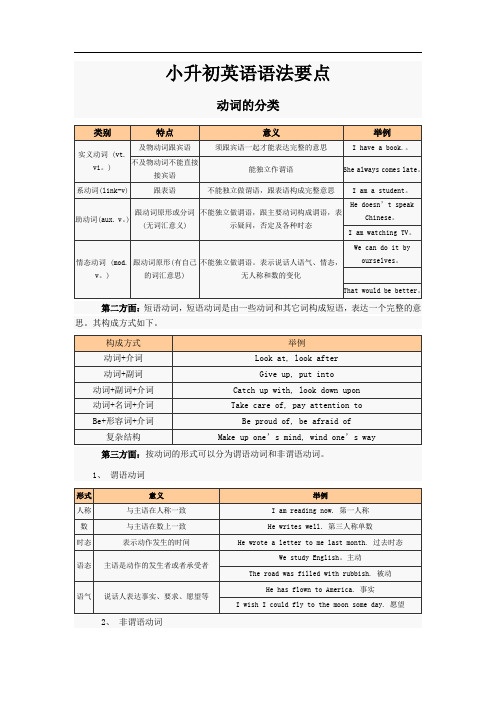
小升初英语语法要点动词的分类step-son→step-sons晚子; son-in-law→sons-in-law。
但是,也有些合成名词,特别是由man和woman构成的合成名词,里面所含的成分,全都要变为复数,如:Man-servant-men-servants,woman doctor-women doctors等五、有些名词经常是带着-s词尾的,但通常都作单数看待,如:Phonetics(语音学),physics(物理学),optics(光学),politics(政治),news(新闻)等。
六、另一些名词则以复数词出现的机会较多例:bellows风箱; clothes; police; shorts短裤; scissors剪刀; spectacles眼镜; shears大剪刀,trousers长裤,wages工资,belongings所有物, surroundings环境,savings储蓄,findings调查结果,arms武器,clothes衣服,stairs楼梯,等七、另外还有一些名词,其复数形式有时可表示特别意思,例:goods货物,waters水域,fishes(各种)鱼,papers文件,证件,greens青菜,m anners礼貌,ruins废墟,troops军队,looks外貌,times时代,等第三部分:不可数名词的计量方法(1)一般用“数字+of+计量单位+名词”表示,(注意:当数字大于一时,表示计量单位的名词可以有复数形式)。
如:a piece of news 一则新闻 a piece of meat 一块肉 a glass of wine一杯酒 two bowls of rice 两碗米 a sum of money 一笔钱 five bags of flour 一袋面粉 a drop o f water 一滴水 three bottles of milk 三瓶牛奶 two pieces of advice 两条建议(2)用much/some/ a little/ little/ a lot of/ plenty of+不可数名词练习题:1、 All the people at the conference are ______。
- 1、下载文档前请自行甄别文档内容的完整性,平台不提供额外的编辑、内容补充、找答案等附加服务。
- 2、"仅部分预览"的文档,不可在线预览部分如存在完整性等问题,可反馈申请退款(可完整预览的文档不适用该条件!)。
- 3、如文档侵犯您的权益,请联系客服反馈,我们会尽快为您处理(人工客服工作时间:9:00-18:30)。
小升初英语情态动词——will
可用于各人称,表示 "意志"、"意愿"、"决心"、"允诺"等。
如:
I will try. 我愿一试。
I will do my best. 我一定尽力而为。
We will never do it again. 我们永远不会再做此事了。
Which will you fake?你要哪一个?
Who will go with me? 谁愿和我一同去?
will在疑问句中用子第二人称时
这时句子表示说话人向对方提出请求或询问。
如:
Will you please explain the sentence once more?请你再把这个句子解释一遍好吗?
Will you have western food or Chinese food,Mr. Smith? 史密斯先生,你吃西餐还是中餐?
Will you pass me the butter? 请你把黄油递给我好吗?
注意下面句中的won't亦表请求:
Won't you come in ?请进来好吗?
[注一] 在条件状语从句中须用现在一般时表将来,但当will用作情态动词表意愿时,则亦可用于条件状语从句,如I'll be glad if you will come.(你如愿来,我将会很高兴)。
[注二]will在下面句子中 = I suppose(我猜想)或probably(大概)。
如:
This will be the room you are looking for. 这大概就是你要找的那个房间。
You will remember the story I told you the other day.你们大概还记得我那天给你们讲的那个故事。
[注三]will有时表示一种习惯动作或状态。
如:
Water will boil at 100 degrees Centigrade.水总是在摄氏100度煮沸。
Boys will be boys.男孩子总是男孩子。
第 1 页。
